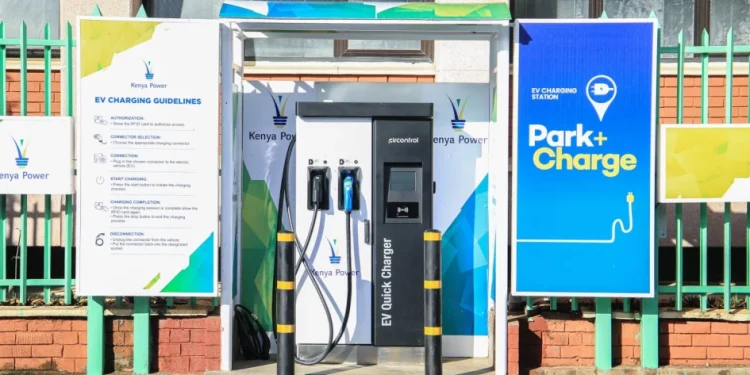Kenya Power has used KSh 6.5 million to set up its second EV charging station at Stima Plaza to easen\ the use of electric vehicles as alternative mobility.
- The station is equipped with two chargers: a 50 kW DC that can charge an electric vehicle for one hour, and a 22 kW AC charger that can transmit energy in two hours.
- The company’s first EV charging station was set up in Ruaraka to specifically cater for Kenya Power transport section which will in the long run include a fleet of electric vehicles.
- Kenya Power also introduced two heavy-duty vehicles at the cost of KSh 18 million (which will run on electric energy), as the company aims to acquire nine electric vehicles and 25 electric motorcycles for its operations before the year ends.
“We have set aside an annual budget of KSh 20 million to set up EV charging stations at all our offices across the country. Beyond the additional EV charging stations that we intend to put up in the current financial year, we intend to install ten additional facilities annually in 2025 and 2026,” said Kenya Power Managing Director Joseph Siror.
E-mobility in Kenya remains a challenge due to scarcity of charging stations. Kenya Power intends to set up nine charging stations before July this year. These stations will be set up in Donholm, Nakuru, Mombasa, Mtito Andei, Kisumu, Eldoret, and Roysambu.
“We intend to use our EV charging stations to collect data that will inform the next steps of our support to the growing e-mobility industry,” said Joseph Siror.
The investment over the next three years is projected to hit KSh 258 million for these goals to be achieved. Kenya Power projects that the growth of the EV sector will translate into higher revenues. But the uptake of electric vehicles will demand not only stable but also cheap electricity. Kenya Power is optimistic about its pioneering role in the EV sector after its rebound into profit territory, but power remains expensive for many consumers who have actively switched to solar power.
Kenya’s EV Policy
Kenya Power’s adoption of electric vehicles is part of its commitment to implement the new e-mobility tariff included in the recent electricity tariff review.
The Energy and Petroleum Regulatory Authority (EPRA) approved special tariffs for the e-mobility sector. The e-mobility tariffs were set at KSh 16 per kWh during peak periods and KSh 8 per kWh during off-peak periods. This is significantly lower than the domestic tariffs charged at about KSh 20 per kWh.
The total number of electric vehicles registered in Kenya sits below the 5,000 mark, but the figure has been rising steadily since 2018. At the beginning of this month, the Electric Mobility Taskforce finalized its public participation forums countrywide to hasten the formulation of a solid EV policy that would guide the adoption process.
The taskforce chairperson Jerotich Seii mentioned that stakeholders in the transport sector were given the opportunity to amplify their opinions, which would be considered in the definitive policy framework.
“The e-mobility policy in Kenya is overdue. We are happy as a task force to be the ones who are introducing this innovative approach to transport and its management,” said Jerotich Seii.
See Also:



